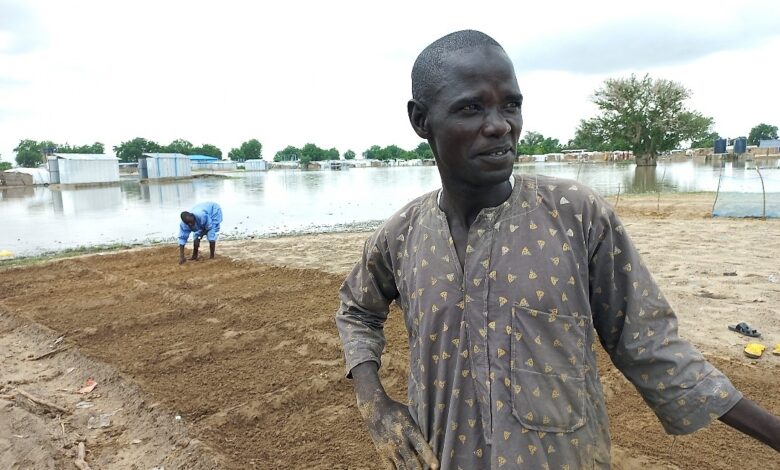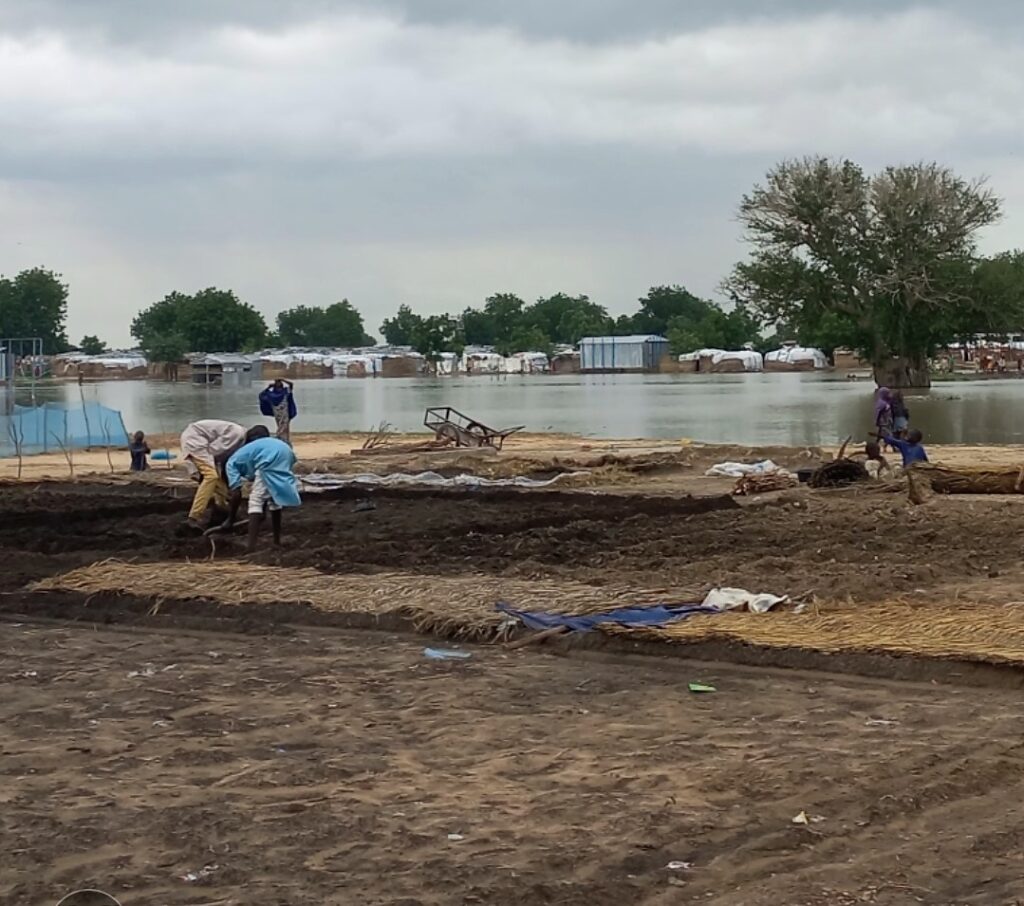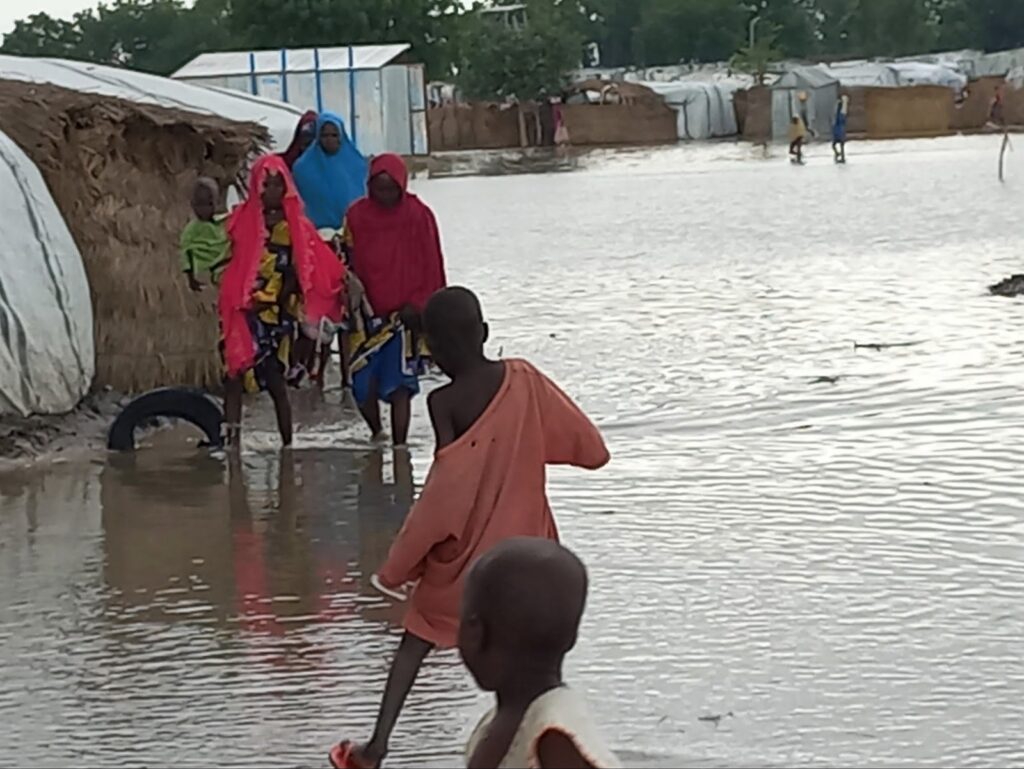Onion Farming Fills Humanitarian Gaps At Borno Unofficial IDP Camp
A large pool of water at the Muna Elbadawi camp sustains the farming business. But during the rainy season, it easily becomes a cause for worry.

One recent late afternoon, Lawan Usman and his three sons cultivate an onion nursery near a large pool of water about twice the size of a football field in the centre of Muna Elbadawi displacement camp in Maiduguri, Borno State.
The cloudy weather has been gentle enough to allow them till more nursery beds where they would sprinkle onion seedlings.
Many other IDPs either water already prepared nurseries covered with woven raffia sheets or till the soil before adding the seeds.
About a hundred meters away are sights of a smoky pyramid of burning timbers covered with grasses and mud — a local way of producing charcoal, which has become a major source of survival for the peasants.
The onion farmers and charcoal makers are part of the ecosystem around a pool of water at the camp. Just as the onion nursery needed constant watering to enable the seeds to germinate, the charcoal pyramid needs constant watering to prevent the fire from flaming and burning the woods into ashes.

The lake is a blessing to the camp, just as it is also a threat to the general health and well-being of the inhabitants.
“I’ve been an onion farmer since back in my days in Darajamal before we got displaced by Boko Haram seven years ago,” Usman said, referring to his village in the Bama area of Borno.
“Since our displacement, we have had nothing to do for sustenance other than waiting for food palliative from the government and NGOs, which seldom come because our camp is not official. So we have no option than resorting to the onion and vegetable farming business that we are used to.”
Usman said they decided to start cultivating the nursery within the camp because growing onions attracts attention and doing it closer to the forest area could be dangerous because of the presence of terrorists. “So we have to reduce the risk by growing the seedlings here in the camp before taking them out after four weeks.”

“The pool of water here is helping us to nurture the onion seedlings,” Usman observed. “This water comes as a blessing to the onion farmers, even though it also has its negative impact on the environment.”
Usman, who is in his late 30s, has three wives and eight children who all depend on him.
“I have no option but to struggle daily to keep the body and soul together. Otherwise, my family will suffer. That is why I have to cultivate onions using the little space I have here. After harvesting the onion seedlings, I take them to the plantation to plant and then sell some to those who need them as well.”
It takes about 90 days to grow and harvest onions after the seedlings have been replanted. Before this stage, the seedlings themselves germinate within about four weeks.
“One is sure of having a crop but we are not sure of harvesting all the yields. It is a 50-50 situation for us because the Boko Haram people sometimes hijack our harvest or prevent us from accessing the farms when they know the plantation is ready for harvesting,” Usman told us.
When it is off-season, he has to look for menial jobs like wood breaking so he can continue to earn a living. He believes IDPs in the area have it tough because the camp is not officially run by the government.
“Most of the food and non-food palliative that we were brought to us in the past was done on an occasional basis and not on a routine basis as was done in the official camps. But the hope of getting support now seems to have diminished because all official camps have been closed, and that means we have no grounds to complain again.”
The authorities have been pushing for the relocation of displaced people out of camps, especially in the state capital, for several years. Last month, the state government flagged off the final phase of the resettlement process.
Though it is not one of those officially recognised by the state government, the Muna Elbadawi IDP camp, because of its size, is set to be closed down alongside others.

HumAngle observed that the large pool of water had cut off the northern flank of the camp, and residents who wanted to get to the other side had to wade through. But that’s not the only problem.
The toilets of the camp were built on the lowest plains, which have been submerged following consistent rainfall. The situation has not only denied the IDPs access to the toilets but caused the content of the pit toilet to flow out and mix with the water.
“Now our children and women don’t have access to the toilets just because they are now inside the pool of water,” Bunu Karimi, one of the IDPs, lamented.
“Just look around you and you will see that most of the toilets are now inside the water. Many have collapsed and many have had their content pour into the water and that is how we have to enter the water to get across to either side of the camp. We struggle all day to keep the children away, but some of them still go there to play in the water.”
There are growing cases of open defecation in the camp, especially around the bank of the pool, because the residents can no longer access the toilets.
Karimi acknowledged that lack of access to toilet facilities is a challenge, but he does not see it as an issue for immediate intervention.
“Who will be talking about toilets when the most important thing we need here is food,” he said.
“In fact, many IDPs here would be angry if they see people coming to erect toilets instead of bringing food to them. Yes, we need the toilets but remember that it is only a person who eats and gets their belly filled that worries about defecation.”
“The bushes are still not safe, especially during the rainy season. And that limits others’ access to food and other forest resources,” he added.
Support Our Journalism
There are millions of ordinary people affected by conflict in Africa whose stories are missing in the mainstream media. HumAngle is determined to tell those challenging and under-reported stories, hoping that the people impacted by these conflicts will find the safety and security they deserve.
To ensure that we continue to provide public service coverage, we have a small favour to ask you. We want you to be part of our journalistic endeavour by contributing a token to us.
Your donation will further promote a robust, free, and independent media.
Donate HereStay Closer To The Stories That Matter




